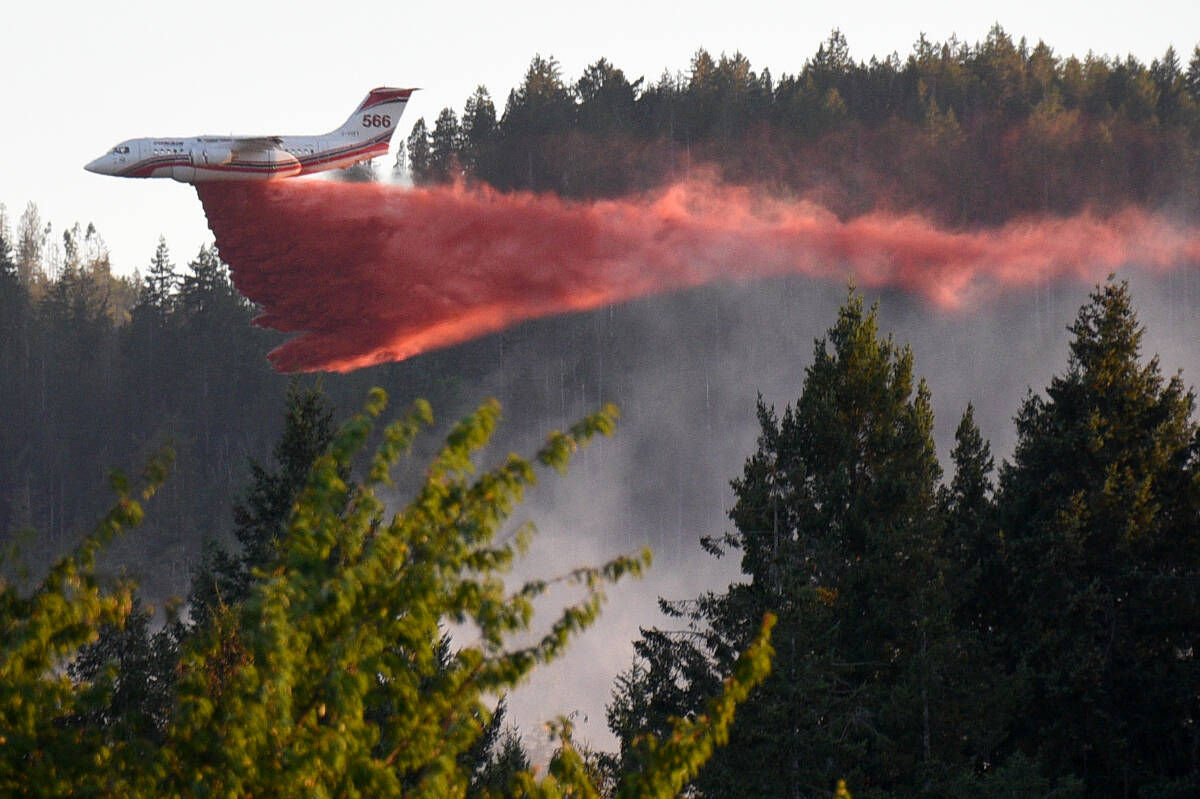A wildfire continues to burn behind an old log sort on Arbutus Mountain, west of Port Alberni. The fire is on the opposite side of the Somass River from the city.
Four firefighting aircraft—first a helicopter equipped with a Bambi Bucket (a specialized bucket suspended on a cable that holds water), then three airtankers from Abbotsford-based Conair—attacked the fire less than an hour after it was first reported on Thursday, Aug. 3. Five members of a B.C. Wildfire Service initial attack ground crew that were dropped off at the site worked until midnight trying to contain the fire, Coastal Fire Centre fire information officer Nick Donnelly said.
The B.C. Wildfire Service has listed the fire as 0.3 hectares, and noted it was discovered at 6:47 p.m. Smoke was visible from all over Port Alberni, and people flocked to Harbour Quay and Victoria Quay to watch the airtankers circle the area.
After the helicopter dropped several loads of water on the fire one of Conair’s land-based airtankers, an Avro RJ85 AT, dropped long-term retardant on the site. The long-term retardant, according to Conair, inhibits combustion even after the water has evaporated.
Early Friday morning the ground crew members were back on scene and had made “good progress,” Donnelly said.
The suspected cause of the fire is still under investigation, the B.C. Wildfire Service noted. The Arbutus Mountain wildfire is not the first for the Alberni Valley this drought-stricken summer.
People flocked to Harbour Quay and Victoria Quay to watch the airtankers circle the area and repeatedly drop the red retardant on the wildfire for an hour Thursday night. Some questioned why the response seemed to be heightened for this fire compared to Cameron Bluffs, which at its height in early June was listed as 229 hectares and reached the side of Highway 4, forcing complete closure of the highway for two and a half weeks. The highway continues to be closed intermittently as fire and road crews clean up damaged trees and falling rocks beside the roadway.
Fire information officer Jade Richardson said there are a number of factors that play into how a wildfire is attacked. She said the Cameron Bluffs fire was the No. 1 priority fire in the Coastal Fire Centre when it was reported in early June, and one of the highest priorities in the province at the time. There were 84 fires burning in B.C. when Cameron Bluffs was added to the list.
“With the Cameron Bluffs fire it was discovered late at night and aviation resources weren’t able to respond,” she said. The steep terrain made the Cameron Bluffs response different than other fires at the time.
”Here we had this report early and it was still light. They could get the tanker crew here right away,” she said.
The Arbutus Mountain fire was reported at 6:47 p.m. and a flight app showed that the bombers were airborne from Abbotsford less than an hour later. In the meantime a helicopter dropped off an initial attack ground crew and then supported the crew with water drops from the Bambi Bucket, or helibucket, until the tankers arrived.
Factors such as visibility or wind also affect how a fire is attacked, and whether certain factors pose a danger to ground or aircrew.
“On any fire we’re constantly evaluating. (On Arbutus Mountain) they’re working hard toward containment.”

